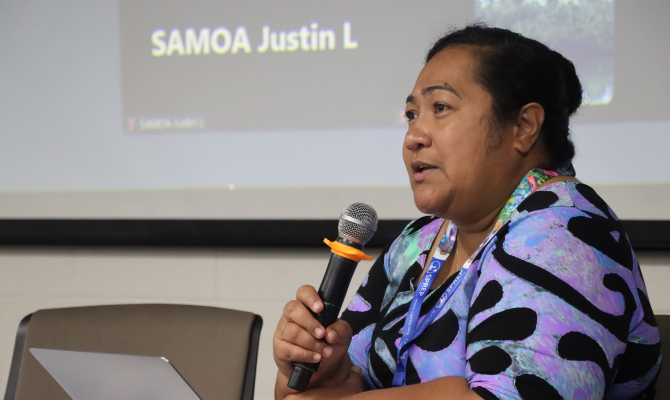
As the world moves closer to finalising a global treaty to end plastic pollution, Pacific Small Island Developing States have reaffirmed their longstanding position: the agreement must be legally binding, contain strong measures to curb plastic production, and reflect the urgency of the crisis facing small island developing states.
Meeting this week in Apia, Samoa, representatives from Pacific Small Island Developing States (PSIDS) are preparing for the final phase of the Intergovernmental Negotiating Committee (INC) process, with INC-5.2 scheduled for 5–14 August 2025 in Geneva, Switzerland.
“Our future is non-negotiable; the future of our children is non-negotiable. We are not willing to compromise on what matters most, the health of our people, our ocean, and our very survival,” said Ms. Pepetua Latasi, Chair of PSIDS and Tuvalu's Permanent Secretary for the Ministry of Home Affairs, Climate Change and Environment. “This treaty must deliver real solutions, not political convenience.”
After three years of complex negotiations, governments worldwide will head to Geneva, knowing it will be a make-or-break INC. No deal was reached at INC 5 in Busan in November, which was intended to be the final round of negotiations. There was still significant divergence among parties, especially when it came to upstream measures such as capping and phasing down virgin plastic production.
Without addressing plastic at its source, Pacific countries argue, the treaty will fail to deliver meaningful impact. “Downstream clean-up will never keep pace with unchecked plastic production. We need to turn off the tap, not just mop the floor,” Ms Latasi stressed.
Pacific Islands are also insisting on robust financial mechanisms and dedicated support for developing countries to implement treaty obligations. Many PSIDS have limited infrastructure and capacity to manage growing volumes of plastic waste, much of which originates from outside the region.
“We did not create this crisis, yet we are living with the worst of its consequences. This treaty must be based on equity, accountability, and access to the means for real change.” said Ms Latasi.
The Pacific’s demands are rooted in UNEA Resolution 5/14, adopted in March 2022, which mandates the development of a legally binding instrument addressing plastic pollution throughout its entire lifecycle.
While Pacific negotiators acknowledge the need for compromise in multilateral processes, they remain firm that ambition must not be sacrificed in the name of consensus.
“We understand that multilateral environmental negotiations are a delicate balancing act, PSIDS will persevere until the last hour of negotiations to ensure our voices are heard and reflected in the final treaty text,” said Ms Latasi.
Since INC 5, formal and informal convenings have been taking place at the margins of diplomatic events in the lead up to INC-5.2. A Heads of Delegation meeting was held in Nairobi, Kenya, last week.
Plastic consumption has quadrupled over the past 30 years. Global plastic production has doubled from 2000 to 2019 reaching 460 million tonnes. Only 9% of all plastics ever produced has been recycled.
The Pacific Regional Preparatory meeting for the second part of the fifth session of the Intergovernmental Negotiating Committee to develop an international legally binding instrument on plastic pollution (INC-5.2) is this week in Apia, Samoa from 7-9 July 2025.
Facilitated by SPREP, the workshop is funded by the Government of Australia through the Pacific Ocean Litter Project (POLP). The INC-5.2 Pacific Regional Preparatory Meeting is attended by Australia, Cook Islands, Federated States of Micronesia, Fiji, Kiribati, Nauru, New Zealand, Niue, Palau, Papua New Guinea, Samoa, Tonga, Tuvalu and Vanuatu.